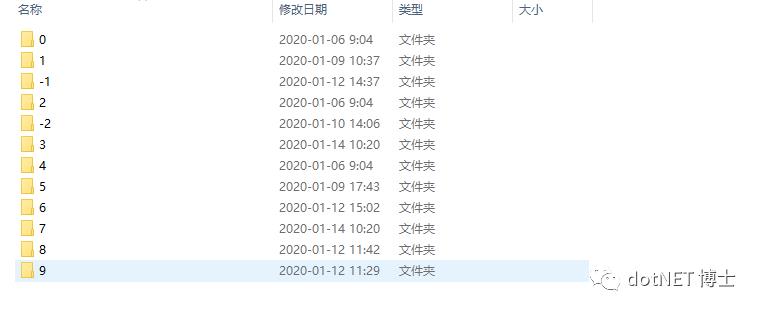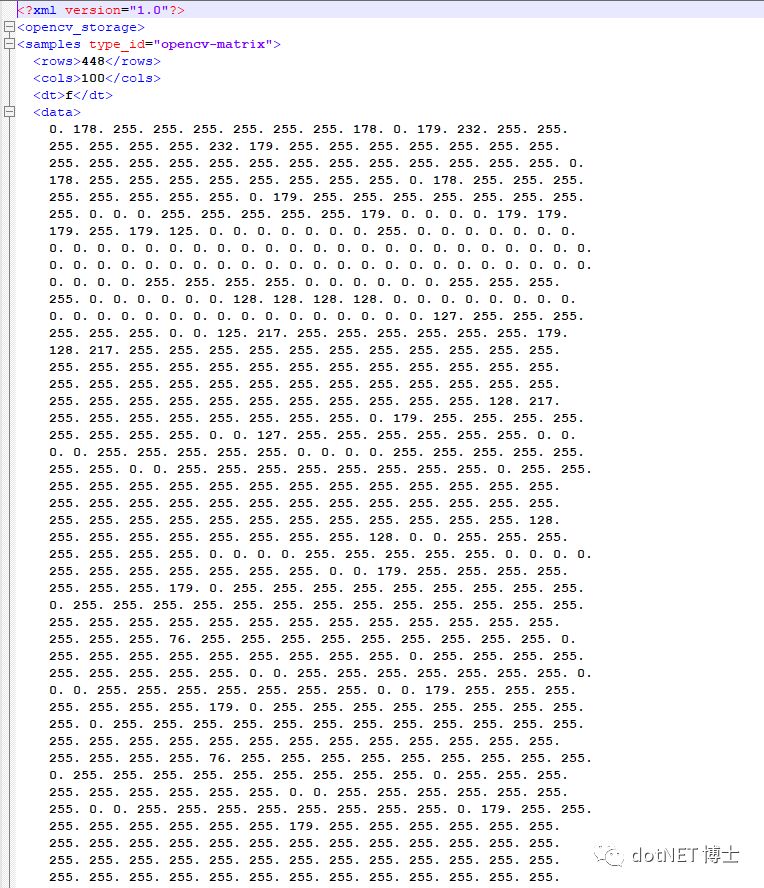opencv +数字识别
Posted dotNET跨平台
tags:
篇首语:本文由小常识网(cha138.com)小编为大家整理,主要介绍了opencv +数字识别相关的知识,希望对你有一定的参考价值。
现在很多场景需要使用的数字识别,比如银行卡识别,以及车牌识别等,在AI领域有很多图像识别算法,大多是居于opencv 或者谷歌开源的tesseract 识别.
由于公司业务需要,需要开发一个客户端程序,同时需要在xp这种老古董的机子上运行,故研究了如下几个数字识别方案,如果大家有更好的方案可以留言告知我,大家一起学习借鉴,不过需要支持XP系统,万分感谢!
ocr 识别的不同选择方案
•tesseract
•放弃:谷歌的开源tesseract ocr识别目前最新版本不支持xp系统
•云端ocr 识别接口(不适用)
•费用比较贵:•场景不同,我们的需求是可能毫秒级别就需要调用一次ocr 识别
•opencv
•概念:OpenCV是一个基于BSD许可(开源)发行的跨平台计算机视觉库,可以运行在Linux、Windows、android和Mac OS操作系统上。它轻量级而且高效——由一系列 C 函数和少量 C++ 类构成,同时提供了Python、Ruby、MATLAB等语言的接口,实现了图像处理和计算机视觉方面的很多通用算法。
以上几种ocr 识别比较,最后选择了opencv 的方式进行ocr 数字识别,下面讲解通过ocr识别的基本流程和算法.
opencv 数字识别流程及算法解析
要通过opencv 进行数字识别离不开训练库的支持,需要对目标图片进行大量的训练,才能做到精准的识别出目标数字;下面我会分别讲解图片训练的过程及识别的过程.
opencv 识别算法原理
1.比如下面一张图片,需要从中识别出正确的数字,需要对图片进行灰度、二值化、腐蚀、膨胀、寻找数字轮廓、切割等一系列操作.
原图
灰度化图

二值化图

寻找轮廓

识别后的结果图

以上就是简单的图片进行灰度化、二值化、寻找数字轮廓得到的识别结果(==这是基于我之前训练过的数字模型下得到的识别结果==) 有些图片比较赋值,比如存在背景斜杠等的图片则需要一定的腐蚀或者膨胀等处理,才能寻找到正确的数字轮廓.
上面的说到我这里使用的是opencv 图像处理库进行的ocr 识别,那我这里简单介绍下C# 怎么使用opencv 图像处理看;
为了在xp上能够运行 我这里通过nuget 包引用了 OpenCvSharp-AnyCPU 第三方库,它使用的是opencv 2410 版本,你们如果不考虑xp系统的情况下开源使用最新的版本,最新版本支持了更多的识别算法.
右击你的个人项目,选择“管理Nuget程序包”。在包管理器页面中,点击“浏览”选项,然后在搜索框中键入“OpenCvSharp-AnyCPU”。选择最顶端的正确项目,并在右侧详情页中点击“安装”,等待安装完成即可。
以上的核心代码如下:
private void runSimpleOCR(string pathName){//构造opcvOcr 库,这里的是我单独对opencv 库进行的一次封装,加载训练库模板var opencvOcr = new OpencvOcr($"{path}Template\\Traindata.xml", opencvOcrConfig: new OCR.Model.OpencvOcrConfig(){ErodeLevel = 2.5,ThresholdType = OpenCvSharp.ThresholdType.Binary,ZoomLevel = 2,});var img = new Bitmap(this.txbFilaName.Text);var mat = img.ToMat();//核心识别方法var str = opencvOcr.GetText(mat, isDebug: true);this.labContent.Content = str;}
opencvOcr 的核心代码如下
const double Thresh = 80;const double ThresholdMaxVal = 255;const int _minHeight = 35;bool _isDebug = false;CvKNearest _cvKNearest = null;OpencvOcrConfig _config = new OpencvOcrConfig() { ZoomLevel = 2, ErodeLevel = 3 };/// <summary>/// 构造函数/// </summary>/// <param name="path">训练库完整路径</param>/// <param name="opencvOcrConfig">OCR相关配置信息</param>public OpencvOcr(string path, OpencvOcrConfig opencvOcrConfig = null){if (string.IsNullOrEmpty(path))throw new ArgumentNullException("path is not null");if (opencvOcrConfig != null)_config = opencvOcrConfig;this.LoadKnearest(path);}/// <summary>/// 加载Knn 训练库模型/// </summary>/// <param name="dataPathFile"></param>/// <returns></returns>private CvKNearest LoadKnearest(string dataPathFile){if (_cvKNearest == null){using (var fs = new FileStorage(dataPathFile, FileStorageMode.Read)){var samples = fs["samples"].ReadMat();var responses = fs["responses"].ReadMat();this._cvKNearest = new CvKNearest();this._cvKNearest.Train(samples, responses);}}return _cvKNearest;}/// <summary>/// OCR 识别,仅仅只能识别单行数字/// </summary>/// <param name="kNearest">训练库</param>/// <param name="path">要识别的图片路径</param>public override string GetText(Mat src, bool isDebug = false){this._isDebug = isDebug;var respMat = MatProcessing(src, isDebug);if (respMat == null)return "";var sortRect = FindContours(respMat.FindContoursMat);return GetText(sortRect, respMat.ResourcMat, respMat.RoiResultMat);}/// <summary>/// 查找轮廓/// </summary>/// <param name="src"></param>/// <returns></returns>private List<Rect> FindContours(Mat src){try{Point[][] contours;HierarchyIndex[] hierarchyIndexes;Cv2.FindContours(src,out contours,out hierarchyIndexes,mode: OpenCvSharp.ContourRetrieval.External,method: OpenCvSharp.ContourChain.ApproxSimple);if (contours.Length == 0)throw new NotSupportedException("Couldn't find any object in the image.");var sortRect = GetSortRect(contours, hierarchyIndexes);sortRect = sortRect.OrderBy(item => item.X).ToList();return sortRect;}catch { }return null;}/// <summary>/// 获得切割后的数量列表/// </summary>/// <param name="contours"></param>/// <param name="hierarchyIndex"></param>/// <returns></returns>private List<Rect> GetSortRect(Point[][] contours, HierarchyIndex[] hierarchyIndex){var sortRect = new List<Rect>();var _contourIndex = 0;while ((_contourIndex >= 0)){var contour = contours[_contourIndex];var boundingRect = Cv2.BoundingRect(contour); //Find bounding rect for each contoursortRect.Add(boundingRect);_contourIndex = hierarchyIndex[_contourIndex].Next;}return sortRect;}/// <summary>/// 是否放大/// </summary>/// <param name="src"></param>/// <returns></returns>private bool IsZoom(Mat src){if (src.Height <= _minHeight)return true;return false;}private List<EnumMatAlgorithmType> GetAlgoritmList(Mat src){var result = new List<EnumMatAlgorithmType>();var algorithm = this._config.Algorithm;try{if (algorithm.Contains("|")){result = algorithm.Split('|').ToList().Select(item => (EnumMatAlgorithmType)Convert.ToInt32(item)).ToList();if (!IsZoom(src))result.Remove(EnumMatAlgorithmType.Zoom);return result;}}catch { }if (IsZoom(src)){result.Add(EnumMatAlgorithmType.Zoom);}if (this._config.ThresholdType == ThresholdType.Binary){//result.Add(EnumMatAlgorithmType.Blur);result.Add(EnumMatAlgorithmType.Gray);result.Add(EnumMatAlgorithmType.Thresh);if (this._config.DilateLevel > 0)result.Add(EnumMatAlgorithmType.Dilate);result.Add(EnumMatAlgorithmType.Erode);return result;}//result.Add(EnumMatAlgorithmType.Blur);result.Add(EnumMatAlgorithmType.Gray);result.Add(EnumMatAlgorithmType.Thresh);if (this._config.DilateLevel > 0)result.Add(EnumMatAlgorithmType.Dilate);result.Add(EnumMatAlgorithmType.Erode);return result;}/// <summary>/// 对查找的轮廓数据进行训练模型匹配,这里使用的是KNN 匹配算法/// </summary>private string GetText(List<Rect> sortRect, Mat source, Mat roiSource){var response = "";try{if ((sortRect?.Count ?? 0) <= 0)return response;var contourIndex = 0;using (var dst = new Mat(source.Rows, source.Cols, MatType.CV_8UC3, Scalar.All(0))){sortRect.ForEach(boundingRect =>{try{if (this._isDebug){Cv2.Rectangle(source, new Point(boundingRect.X, boundingRect.Y),new Point(boundingRect.X + boundingRect.Width, boundingRect.Y + boundingRect.Height),new Scalar(0, 0, 255), 1);Cv2.Rectangle(roiSource, new Point(boundingRect.X, boundingRect.Y),new Point(boundingRect.X + boundingRect.Width, boundingRect.Y + boundingRect.Height),new Scalar(0, 0, 255), 1);}var roi = roiSource.GetROI(boundingRect); //Crop the imageroi = roi.Compress();var result = roi.ConvertFloat();var results = new Mat();var neighborResponses = new Mat();var dists = new Mat();var detectedClass = (int)this._cvKNearest.FindNearest(result, 1, results, neighborResponses, dists);var resultText = detectedClass.ToString(CultureInfo.InvariantCulture);var isDraw = false;if (detectedClass >= 0){response += detectedClass.ToString();isDraw = true;}if (detectedClass == -1 && !response.Contains(".")){response += ".";resultText = ".";isDraw = true;}try{//if (this._isDebug)//{Write(contourIndex, detectedClass, roi);//}}catch { }if (this._isDebug && isDraw){Cv2.PutText(dst, resultText, new Point(boundingRect.X, boundingRect.Y + boundingRect.Height), 0, 1, new Scalar(0, 255, 0), 2);}result?.Dispose();results?.Dispose();neighborResponses?.Dispose();dists?.Dispose();contourIndex++;}catch (Exception ex){TextHelper.Error("GetText ex", ex);}});source.IsDebugShow("Segmented Source", this._isDebug);dst.IsDebugShow("Detected", this._isDebug);dst.IsDebugWaitKey(this._isDebug);dst.IsDebugImWrite("dest.jpg", this._isDebug);}}catch{throw;}finally{source?.Dispose();roiSource?.Dispose();}return response;}/// <summary>/// 图片处理算法/// </summary>/// <param name="src"></param>/// <param name="isDebug"></param>/// <returns></returns>public ImageProcessModel MatProcessing(Mat src, bool isDebug = false){src.IsDebugShow("原图", isDebug);var list = GetAlgoritmList(src);var resultMat = new Mat();src.CopyTo(resultMat);var isZoom = IsZoom(src);list?.ForEach(item =>{switch (item){case EnumMatAlgorithmType.Dilate:resultMat = resultMat.ToDilate(Convert.ToInt32(this._config.DilateLevel));resultMat.IsDebugShow(EnumMatAlgorithmType.Dilate.GetDescription(), isDebug);break;case EnumMatAlgorithmType.Erode:var eroderLevel = isZoom ? this._config.ErodeLevel * this._config.ZoomLevel : this._config.ErodeLevel;resultMat = resultMat.ToErode(eroderLevel);resultMat.IsDebugShow(EnumMatAlgorithmType.Erode.GetDescription(), isDebug);break;case EnumMatAlgorithmType.Gray:resultMat = resultMat.ToGrey();resultMat.IsDebugShow(EnumMatAlgorithmType.Gray.GetDescription(), isDebug);break;case EnumMatAlgorithmType.Thresh:var thresholdValue = this._config.ThresholdValue <= 0 ? resultMat.GetMeanThreshold() : this._config.ThresholdValue;resultMat = resultMat.ToThreshold(thresholdValue, thresholdType: this._config.ThresholdType);resultMat.IsDebugShow(EnumMatAlgorithmType.Thresh.GetDescription(), isDebug);break;case EnumMatAlgorithmType.Zoom:resultMat = resultMat.ToZoom(this._config.ZoomLevel);src = resultMat;resultMat.IsDebugShow(EnumMatAlgorithmType.Zoom.GetDescription(), isDebug);break;case EnumMatAlgorithmType.Blur:resultMat = resultMat.ToBlur();src = resultMat;resultMat.IsDebugShow(EnumMatAlgorithmType.Blur.GetDescription(), isDebug);break;}});var oldThreshImage = new Mat();resultMat.CopyTo(oldThreshImage);return new ImageProcessModel(){ResourcMat = src,FindContoursMat = oldThreshImage,RoiResultMat = resultMat};}
opencv 图片处理开放出去的配置对象实体如下:
public class OpencvOcrConfig{/// <summary>/// 放大程度级别 默认2/// </summary>public double ZoomLevel { set; get; }/// <summary>/// 腐蚀级别 默认2.5/// </summary>public double ErodeLevel { set; get; }/// <summary>/// 膨胀/// </summary>public double DilateLevel { set; get; }/// <summary>/// 阀值/// </summary>public double ThresholdValue { set; get; }/// <summary>/// 图片处理算法,用逗号隔开/// </summary>public string Algorithm { set; get; }/// <summary>/// 二值化方式/// </summary>public ThresholdType ThresholdType { set; get; } = ThresholdType.BinaryInv;/// <summary>/// 通道模式/// </summary>public OcrChannelTypeEnums ChannelType { set; get; } = OcrChannelTypeEnums.BlackBox;}
opencv 图片处理算法扩展方法如下:
public static partial class OpenCvExtensions{private const int Thresh = 200;private const int ThresholdMaxVal = 255;/// <summary>/// Bitmap Convert Mat/// </summary>/// <param name="bitmap"></param>/// <returns></returns>public static Mat ToMat(this System.Drawing.Bitmap bitmap){return OpenCvSharp.Extensions.BitmapConverter.ToMat(bitmap);}/// <summary>/// Bitmap Convert Mat/// </summary>/// <param name="bitmap"></param>/// <returns></returns>public static System.Drawing.Bitmap ToBitmap(this Mat mat){return OpenCvSharp.Extensions.BitmapConverter.ToBitmap(mat);}public static bool MatIsEqual(this Mat mat1, Mat mat2){try{if (mat1.Empty() && mat2.Empty()){return true;}if (mat1.Cols != mat2.Cols || mat1.Rows != mat2.Rows || mat1.Dims() != mat2.Dims() ||mat1.Channels() != mat2.Channels()){return false;}if (mat1.Size() != mat2.Size() || mat1.Type() != mat2.Type()){return false;}var nrOfElements1 = mat1.Total() * mat1.ElemSize();if (nrOfElements1 != mat2.Total() * mat2.ElemSize())return false;return MatPixelEqual(mat1, mat2);}catch (Exception ex){TextHelper.Error("MatIsEqual 异常", ex);return true;}}/// <summary>/// 灰度/// </summary>/// <param name="mat"></param>/// <returns></returns>public static Mat ToGrey(this Mat mat){try{Mat grey = new Mat();Cv2.CvtColor(mat, grey, OpenCvSharp.ColorConversion.BgraToGray);return grey;}catch{return mat;}}/// <summary>/// 二值化/// </summary>/// <param name="data"></param>/// <returns></returns>public static Mat ToThreshold(this Mat data, double threshValue = 0, ThresholdType thresholdType = ThresholdType.BinaryInv){Mat threshold = new Mat();if (threshValue == 0)threshValue = Thresh;Cv2.Threshold(data, threshold, threshValue, ThresholdMaxVal, thresholdType);if (threshold.IsBinaryInv()){Cv2.Threshold(threshold, threshold, threshValue, ThresholdMaxVal, ThresholdType.BinaryInv);}return threshold;}/// <summary>/// 是否调试显示/// </summary>/// <param name="src"></param>/// <param name="name"></param>/// <param name="isDebug"></param>public static void IsDebugShow(this Mat src, string name, bool isDebug = false){if (!isDebug)return;Cv2.ImShow(name, src);}public static void IsDebugWaitKey(this Mat src, bool isDebug = false){if (!isDebug)return;Cv2.WaitKey();}public static void IsDebugImWrite(this Mat src, string path, bool isDebug = false){if (!isDebug)return;try{Cv2.ImWrite(path, src);}catch { }}/// <summary>/// Mat 转成另外一种存储矩阵方式/// </summary>/// <param name="roi"></param>/// <returns></returns>public static Mat ConvertFloat(this Mat roi){var resizedImage = new Mat();var resizedImageFloat = new Mat();Cv2.Resize(roi, resizedImage, new Size(10, 10)); //resize to 10X10resizedImage.ConvertTo(resizedImageFloat, MatType.CV_32FC1); //convert to floatvar result = resizedImageFloat.Reshape(1, 1);return result;}/// <summary>/// 腐蚀/// </summary>/// <param name="mat"></param>/// <returns></returns>public static Mat ToErode(this Mat mat, double level){#region 自动会判断是否需要腐蚀if (level < 1){return mat;}#endregionvar erode = new Mat();var copyMat = new Mat();mat.CopyTo(copyMat);Cv2.Erode(mat, erode, Cv2.GetStructuringElement(StructuringElementShape.Ellipse, new Size(level, level)));return erode;}/// <summary>/// 膨胀/// </summary>/// <param name="mat"></param>/// <returns></returns>public static Mat ToDilate(this Mat mat, int level){if (level <= 0)return mat;var dilate = new Mat();Cv2.Dilate(mat, dilate, Cv2.GetStructuringElement(StructuringElementShape.Ellipse, new Size(level, level)));return dilate;}/// <summary>/// mat 转Roi/// </summary>/// <param name="image"></param>/// <param name="boundingRect"></param>/// <returns></returns>public static Mat GetROI(this Mat image, Rect boundingRect){try{return new Mat(image, boundingRect); //Crop the image}catch{}return null;}/// <summary>/// 获取平均阀值/// </summary>/// <param name="mat"></param>/// <returns></returns>public static int GetMeanThreshold(this Mat mat){var width = mat.Width;var height = mat.Height;var m = mat.Reshape(1, width * height);return (int)m.Sum() / (width * height);}/// <summary>/// 获得二值化阀值/// </summary>/// <param name="bitmap"></param>/// <returns></returns>public static int GetMeanThreshold(this System.Drawing.Bitmap bitmap){using (var mat = bitmap.ToMat())using (var grap = mat.ToGrey()){return grap.GetMeanThreshold();}}public static bool IsErode(this System.Drawing.Bitmap bitmap){using (var mat = bitmap.ToMat())using (var grap = mat.ToGrey()){var thresholdValue = grap.GetMeanThreshold();using (var threshold = grap.ToThreshold(thresholdValue, ThresholdType.BinaryInv)){return threshold.IsErode();}}}/// <summary>/// 放大/// </summary>/// <param name="img"></param>/// <param name="times"></param>/// <returns></returns>public static Mat ToZoom(this Mat img, double times){if (times <= 0)return img;var width = img.Width * times;var height = img.Height * times;img = img.Resize(new Size(width, height), 0, 0, Interpolation.NearestNeighbor);return img;}/// <summary>/// 均值滤波/// </summary>/// <param name="img"></param>/// <returns></returns>public static Mat ToBlur(this Mat img){return img.Blur(new Size(3, 3));}public static Mat Compress(this Mat img){var width = 28.0 * img.Width / img.Height;var fWidth = width / img.Width;var fHeight = 28.0 / img.Height;img = img.Resize(new Size(width, 28), fWidth, fHeight, Interpolation.NearestNeighbor);return img;}public static bool MatPixelEqual(this Mat src, Mat are){var width = src.Width;var height = src.Height;var sum = width * height;for (int row = 0; row < height; row++){for (int col = 0; col < width; col++){byte p = src.At<byte>(row, col); //获对应矩阵坐标的取像素byte pAre = are.At<byte>(row, col);if (p != pAre)return false;}}return true;}public static int GetSumPixelCount(this Mat threshold){var width = threshold.Width;var height = threshold.Height;var sum = width * height;var value = 0;for (int row = 0; row < height; row++){for (int col = 0; col < width; col++){byte p = threshold.At<byte>(row, col); //获对应矩阵坐标的取像素value++;}}return value;}public static int GetPixelCount(this Mat threshold, System.Drawing.Color color){var width = threshold.Width;var height = threshold.Height;var sum = width * height;var value = 0;for (int row = 0; row < height; row++){for (int col = 0; col < width; col++){byte p = threshold.At<byte>(row, col); //获对应矩阵坐标的取像素if (Convert.ToInt32(p) == color.R){value++;}}}return value;}/// <summary>/// 是否需要二值化反转/// </summary>/// <param name="threshold"></param>/// <returns></returns>public static bool IsBinaryInv(this Mat threshold){var width = threshold.Width;var height = threshold.Height;var sum = Convert.ToDouble(width * height);var black = GetPixelCount(threshold, System.Drawing.Color.Black);return (Convert.ToDouble(black) / sum) < 0.5;}/// <summary>/// 是否需要腐蚀/// </summary>/// <param name="mat"></param>/// <returns></returns>public static bool IsErode(this Mat mat){var percent = mat.GetPercent();return percent >= 0.20;}/// <summary>/// 获得白色像素占比/// </summary>/// <param name="threshold"></param>/// <returns></returns>public static double GetPercent(this Mat threshold){var width = threshold.Width;var height = threshold.Height;var sum = Convert.ToDouble(width * height);var white = GetPixelCount(threshold, System.Drawing.Color.White);return (Convert.ToDouble(white) / sum);}/// <summary>/// 根据模板查找目标图片的在原图标中的开始位置坐标/// </summary>/// <param name="source"></param>/// <param name="template"></param>/// <param name="matchTemplateMethod"></param>/// <returns></returns>public static Point FindTemplate(this Mat source, Mat template, MatchTemplateMethod matchTemplateMethod = MatchTemplateMethod.SqDiffNormed){if (source == null)return new OpenCvSharp.CPlusPlus.Point();var result = new Mat();Cv2.MatchTemplate(source, template, result, matchTemplateMethod);Cv2.MinMaxLoc(result, out OpenCvSharp.CPlusPlus.Point minVal, out OpenCvSharp.CPlusPlus.Point maxVal);var topLeft = new OpenCvSharp.CPlusPlus.Point();if (matchTemplateMethod == MatchTemplateMethod.SqDiff || matchTemplateMethod == MatchTemplateMethod.SqDiffNormed){topLeft = minVal;}else{topLeft = maxVal;}return topLeft;}}
以上代码中开源对图片进行轮廓切割,同时会生成切割后的图片代码如下
#region 绘制及输出切割信息库try{Write(contourIndex, detectedClass, roi);}catch { }#endregionprivate void Write(int contourIndex, int detectedClass, Mat roi){Task.Factory.StartNew(() =>{try{var templatePath = $"{AppDomain.CurrentDomain.BaseDirectory}template";FileHelper.CreateDirectory(templatePath);var templatePathFile = $"{templatePath}/{contourIndex}_{detectedClass.ToString()}.png";Cv2.ImWrite(templatePathFile, roi);if (!roi.IsDisposed){roi.Dispose();}}catch {}});}
切割后的图片如下:
这里我已经对数字进行切割好了,接下来就是需要对0-9 这些数字进行分类(建立文件夹进行数字归类),如下:
图中的每一个分类都是我事先切割好的数字图片,图中有-1 和-2 这两个特殊分类,-1 里面我是放的是“.”好的分类,用于训练“.”的图片,这样就可以识别出小数点的数字支持. -2 这个分类主要是其他一些无关紧要的图片,也就是不是数字和点的都归为这一类中.
现在训练库分类已经建立好了,接下来我们需要对这些分类数字进行归一化处理,生成训练模型. 代码如下:
private void Button_Click_1(object sender, RoutedEventArgs e){var opencvOcr = new OpencvOcr($"{path}Template\\Traindata.xml", opencvOcrConfig: null);opencvOcr.Save($"{path}Template\\NumberWrite", outputPath: $"{path}Template\\Traindata.xml");MessageBox.Show("生成训练库成功");//var img = new Bitmap(this.txbFilaName.Text);//var str = opencvOcr.GetText(img.ToMat(), isDebug: true);//this.labContent.Content = str;}/// <summary>/// 保存训练模型/// </summary>/// <param name="dataPath"></param>/// <param name="trainExt"></param>/// <param name="dataPathFile"></param>public void Save(string dataPath, string trainExt = "*.png", string outputPath = ""){if (string.IsNullOrEmpty(outputPath))throw new ArgumentNullException("save dataPath is not null");var trainingImages = this.ReadTrainingImages(dataPath, trainExt);var samples = GetSamples(trainingImages);var response = GetResponse(trainingImages);//写入到训练库中using (var fs = new FileStorage(outputPath, FileStorageMode.WriteText)){fs.Write("samples", samples);fs.Write("responses", response);}}/// <summary>/// 根据目录加载文件/// </summary>/// <param name="path"></param>/// <param name="ext"></param>/// <returns></returns>private IList<ImageInfo> ReadTrainingImages(string path, string ext){var images = new List<ImageInfo>();var imageId = 1;foreach (var dir in new DirectoryInfo(path).GetDirectories()){var groupId = int.Parse(dir.Name);foreach (var imageFile in dir.GetFiles(ext)){var srcMat = new Mat(imageFile.FullName, OpenCvSharp.LoadMode.GrayScale);var image = srcMat.ConvertFloat();if (image == null){continue;}images.Add(new ImageInfo{Image = image,ImageId = imageId++,ImageGroupId = groupId});}}return images;}/// <summary>/// Mat 转成另外一种存储矩阵方式/// </summary>/// <param name="roi"></param>/// <returns></returns>public static Mat ConvertFloat(this Mat roi){var resizedImage = new Mat();var resizedImageFloat = new Mat();Cv2.Resize(roi, resizedImage, new Size(10, 10)); //resize to 10X10resizedImage.ConvertTo(resizedImageFloat, MatType.CV_32FC1); //convert to floatvar result = resizedImageFloat.Reshape(1, 1);return result;}/// <summary>/// 获取Samples/// </summary>/// <param name="trainingImages"></param>/// <returns></returns>private Mat GetSamples(IList<ImageInfo> trainingImages){var samples = new Mat();foreach (var trainingImage in trainingImages){samples.PushBack(trainingImage.Image);}return samples;}private Mat GetResponse(IList<ImageInfo> trainingImages){var labels = trainingImages.Select(x => x.ImageGroupId).ToArray();var responses = new Mat(labels.Length, 1, MatType.CV_32SC1, labels);var tmp = responses.Reshape(1, 1); //make continuousvar responseFloat = new Mat();tmp.ConvertTo(responseFloat, MatType.CV_32FC1); // Convert to floatreturn responses;}
到这里ocr 训练模型以及建立好了,会在目录中生成一个Traindata.xml 的训练模型库,我们来打开这个训练模型库文件探索它的神秘的容颜.
如果大家有更好的数字识别方案可以留言告知我,这样可以更好的应用到实际场景中需求场景:
客户端调用,不走api方式
必须要xp这种老爷机的支持
以上是关于opencv +数字识别的主要内容,如果未能解决你的问题,请参考以下文章
在 Python 多处理进程中运行较慢的 OpenCV 代码片段
OpenCV-Python实战(番外篇)——利用 SVM 算法识别手写数字
